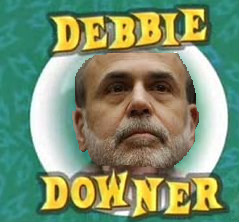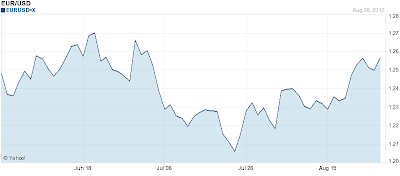Sell These Energy Stocks Today
I believe that a Federal Reserve cut to its 2013 economic forecast Wednesday should serve as a driver of concern about cyclical energy demand. If I am correct, these energy ideas should see near-term weakness. Thus, I believe capital could be preserved by a temporary reduction in holdings here. Over the longer term (one-year), I favor energy for geopolitical and economic reasons, but I believe a nimble trade here could prove to be value-added.
I recently discussed long/short considerations for Exxon Mobil (XOM) in a stock specific article. However, as I considered the issue, I believe it has broader reaching impact than to just Exxon Mobil, and that investors in the five widely held energy stocks discussed here would also benefit from the investment thesis.
Stock
|
Year-to-Date Performance
|
Exxon Mobil (NYSE: XOM)
|
+3.0%
|
Chevron (NYSE: CVX)
|
+11.3%
|
ConocoPhillips (NYSE: COP)
|
+3.4%
|
BP (NYSE: BP)
|
Unch.
|
Halliburton (NYSE: HAL)
|
+14.6%
|
As you can see, the upward gains of the energy equipment and services and exploration and production companies have been outsized in comparison to the integrated behemoths. They tend to be more cyclical in nature, with exploration and development activity weighing heavily on demand and the price of the commodities. As a result, they are likely to exaggerate downside performance as well.
Stock
|
Year-to-Date Thru 3/19
|
Beta
|
Halliburton (HAL)
|
+14.6%
|
1.8
|
Schlumberger (NYSE: SLB)
|
+7.2%
|
1.8
|
Baker Hughes (NYSE: BHI)
|
+10.8%
|
1.8
|
Transocean (NYSE: RIG)
|
+16.9%
|
2.0
|
Chesapeake Energy (NYSE: CHK)
|
+27.3%
|
1.3
|
However, the entire energy sector should be impacted by a reconsideration of global economic activity. Each of these stocks should be negatively impacted by any such downgrade to U.S. economic expectations as discussed in my previous work, Fed Warning – Expect a Sharp Cut to the Economic Forecast.
In short, my expectation is that the Fed will revise its 2013 economic outlook significantly lower Wednesday. The basis of this view is multifaceted. I believe the fourth quarter GDP growth disappointment was born of the government’s fumbling of the fiscal cliff and debt ceiling issues. Economic growth was just 0.1% in Q4 2012, versus expectations for 0.5% growth. There’s strong possibility that the same issue impacted Q1 2013, though to a lesser degree. I do not believe the issue was adequately accounted for within the Fed’s December 2012 published economic forecast.
Also, we know from the Fed and the Budget Office that the sequester spending cuts will likely burden economic growth by 0.6 percentage points this year. We also know that the Fed expects a 1.5 percentage point burden in total from the sequester cuts and from the expiration of the payroll tax break and on other implemented austerity-like measures. These figures do not appear to be accounted for within the previous Fed forecasts, since December’s forecast was only cut slightly versus September’s, to a 2.3% to 3.0% growth range. If the Fed revises the economic outlook today, the shares of cyclical stocks and other major energy names should retrench along with oil and gas prices.
Please see our disclosures at the Wall Street Greek website and author bio pages found there. This article and website in no way offers or represents financial or investment advice. Information is provided for entertainment purposes only.
Labels: Editors_Picks, Editors-Picks-2013-Q1, Featured, Federal-Reserve-2012-Q3, SECTOR-Energy, Stocks, Stocks-2013-Q1

































